BMW 1 Series VS Hyundai Bayon
BMW 1 Series
The BMW 1 Series stands out with its dynamic design that embodies both elegance and sportiness, making it an attractive choice for urban driving. Its interior offers a premium feel, combining quality materials with the latest in technological features to enhance comfort and connect drivers. Under the bonnet, a range of efficient engines ensures a responsive and enjoyable driving experience, balancing power with practicality.
more informationHyundai Bayon
The Hyundai Bayon is a compact crossover that effortlessly merges practicality with modern design. Its sleek exterior and spacious interior make it an ideal choice for urban settings and longer journeys alike. With a focus on comfort and connectivity, this vehicle provides a smooth driving experience paired with advanced technology features.
more information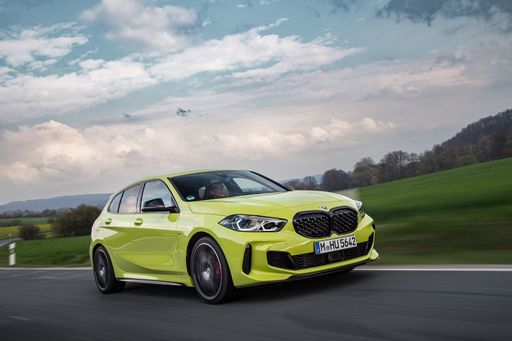 @ press.bmwgroup.com
@ press.bmwgroup.com
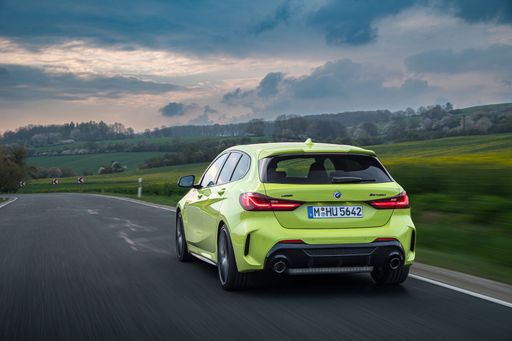 @ press.bmwgroup.com
@ press.bmwgroup.com
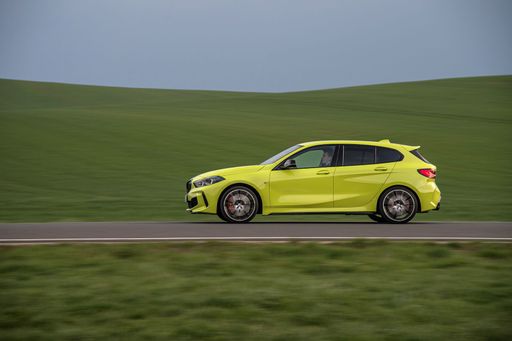 @ press.bmwgroup.com
@ press.bmwgroup.com
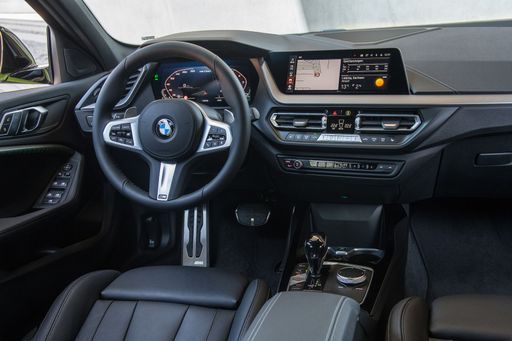 @ press.bmwgroup.com
@ press.bmwgroup.com
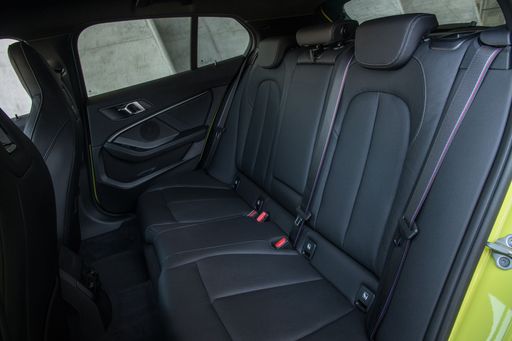 @ press.bmwgroup.com
@ press.bmwgroup.com
 @ hyundai.news
@ hyundai.news
 @ hyundai.news
@ hyundai.news
 @ hyundai.news
@ hyundai.news
 @ hyundai.news
@ hyundai.news
 @ hyundai.news
@ hyundai.news
Costs and Consumption |
|
|---|---|
|
Price
about 28200 - 51000
£
|
Price
about 19600 - 25400
£
|
|
Consumption L/100km
4.3 - 7.6
L
|
Consumption L/100km
5.4
L
|
|
Consumption kWh/100km
-
|
Consumption kWh/100km
-
|
|
Electric Range
-
|
Electric Range
-
|
|
Battery Capacity
-
|
Battery Capacity
-
|
|
co2
112 - 173
g/km
|
co2
122
g/km
|
|
Fuel tank capacity
49
L
|
Fuel tank capacity
40
L
|
Dimensions and Body |
|
|
Body Type
Hatchback
|
Body Type
SUV
|
|
Seats
5
|
Seats
5
|
|
Doors
5
|
Doors
5
|
|
Curb weight
1465 - 1625
kg
|
Curb weight
1170 - 1195
kg
|
|
Trunk capacity
300 - 380
L
|
Trunk capacity
411
L
|
|
Length
4361
mm
|
Length
4180
mm
|
|
Width
1800
mm
|
Width
1775
mm
|
|
Height
1459
mm
|
Height
1500
mm
|
|
Payload
475 - 510
kg
|
Payload
460 - 465
kg
|
Engine and Performance |
|
|
Engine Type
Diesel, Petrol MHEV, Diesel MHEV, Petrol
|
Engine Type
Petrol
|
|
Transmission
Automatic
|
Transmission
Manuel, Automatic
|
|
Transmission Detail
Automat. Schaltgetriebe (Doppelkupplung)
|
Transmission Detail
Manual Gearbox, Automat. Schaltgetriebe (Doppelkupplung)
|
|
Drive Type
Front-Wheel Drive, All-Wheel Drive
|
Drive Type
Front-Wheel Drive
|
|
Power HP
122 - 300
HP
|
Power HP
100
HP
|
|
Acceleration 0-100km/h
4.9 - 9.8
s
|
Acceleration 0-100km/h
11.3 - 12.4
s
|
|
Max Speed
210 - 250
km/h
|
Max Speed
176 - 179
km/h
|
|
Torque
230 - 400
Nm
|
Torque
172 - 200
Nm
|
|
Number of Cylinders
3 - 4
|
Number of Cylinders
3
|
|
Power kW
90 - 221
kW
|
Power kW
74
kW
|
|
Engine capacity
1499 - 1998
cm3
|
Engine capacity
998
cm3
|
|
Top speed
210 - 250
km/h
|
Top speed
176 - 179
km/h
|
General |
|
|
Model Year
2024
|
Model Year
2024
|
|
CO2 Efficiency Class
D, C, F
|
CO2 Efficiency Class
D
|
|
Brand
BMW
|
Brand
Hyundai
|
BMW 1 Series
Exploring the BMW 1 Series: A Compact Powerhouse
The latest iteration of the BMW 1 Series continues to set the benchmark for premium compact cars, blending cutting-edge technology and efficient performance. Known for its sporty design and responsive driving dynamics, the BMW 1 Series offers a range of options that cater to varied preferences and needs. Let’s delve into the technical details and innovations that make this vehicle a standout in its class.
Advanced Engine Variants and Performance
Under the hood, the BMW 1 Series offers a varied selection of powertrains, including diesel, petrol mild-hybrid, and pure petrol options. Power outputs range from 150 to an impressive 300 PS, allowing drivers to opt for either efficiency or sheer performance. The utilisation of mild-hybrid technology in some variants ensures a smooth and efficient drive, with increased torque available for dynamic acceleration.
All models come equipped with an Automatic Transmission, more specifically, a double-clutch gearbox for seamless gear transitions, offering a responsive drive whether you're navigating city streets or the open road. The top-of-the-line M135 variant boasts all-wheel drive capability, enhancing traction and control even further.
Efficient and Sustainable Driving
The BMW 1 Series is engineered for efficiency, achieving fuel consumption as low as 4.3 litres per 100 km in some diesel variants, while the petrol models also demonstrate competitive efficiency ratings. In terms of emissions, the range offers CO2 output figures between 112 to 173 g/km, garnering respectable CO2-efficiency ratings. Additionally, the mild-hybrid variants benefit from regenerative braking, which captures energy usually lost during braking and uses it to power the vehicle.
Innovative Technology and Comfort
Step inside the BMW 1 Series and you'll find a driver-focused cockpit outfitted with the latest in automotive technology. The infotainment system is hosted on a high-resolution display, providing easy access to navigation, entertainment, and vehicle settings. Key features like smartphone integration and voice control enhance the connectivity options available, creating a seamless link between driver and machine.
On the comfort front, the BMW 1 Series provides a refined interior experience, with high-quality materials and finishes. There's generous space for up to five passengers, alongside a versatile boot capacity that ranges from 300 to 380 litres, accommodating both daily errands and weekend getaways.
Design and Dimensions
The exterior design of the BMW 1 Series showcases its sporty lineage with a compact and agile silhouette. Measuring 4361 mm in length and 1800 mm in width, it maintains a confident road stance, while its height of 1459 mm contributes to a sleek, aerodynamic profile. Furthermore, the 1 Series is available in several stylistic options, providing aesthetics that can be customised to personal preference, including M Sport packages that introduce more aggressive styling cues.
Conclusion: A Harmony of Performance and Comfort
The BMW 1 Series deftly balances performance, efficiency, and comfort, making it a compelling choice for those in the market for a premium compact car. With its range of powerful engines, state-of-the-art technology, and stylish design, the BMW 1 Series remains a leader in its segment. Whether you prioritise sporty performance or efficient urban commuting, the 1 Series is equipped to deliver beyond expectations.
Hyundai Bayon
Introducing the Hyundai Bayon: A New Era in Compact SUVs
The Hyundai Bayon, a compact SUV designed with urban adventurers in mind, is making waves with its exceptional blend of style, performance, and technology. The brand has pulled out all the stops to ensure that the Bayon stands out in the crowded SUV market, offering a vehicle that is both practical and innovative.
Sleek Design and Cutting-Edge Aerodynamics
The Bayon features a striking exterior design, characterised by its bold lines and angular shapes. With a length of 4180 mm, a width of 1775 mm, and a height of 1500 mm, the Bayon commands attention with its modern appeal and aerodynamic efficiency. These dimensions not only contribute to its sleek design but also enhance fuel efficiency, achieving an impressive 5.4 L/100 km.
Engine Performance and Specifications
Under the bonnet, the Bayon is powered by a 1.0-litre T-GDI petrol engine, delivering a robust 100 PS or 74 kW. This engine is available with either a manual or automatic gearbox, meeting varied driver preferences. The front-wheel-drive system complements its urban-centric design, ensuring a smooth and responsive ride.
Maximised Interior Space and Comfort
The spacious interior of the Bayon accommodates up to five passengers comfortably. The vehicle boasts a boot space of 411 litres, perfect for both everyday use and weekend getaways. The cabin is designed with practicality and technology in mind, with intuitive controls and ample storage options.
Advanced Technology and Connectivity
Hyundai has equipped the Bayon with state-of-the-art technology to enhance the driving experience. The SUV features a high-resolution touchscreen, offering seamless connectivity with Apple CarPlay and Android Auto. Safety is also a priority, with multiple driver assistance systems including lane-keeping assist and forward collision avoidance assist.
Environmental Efficiency
Despite its powerful performance, the Bayon achieves a respectable CO2 efficiency class of D, with emissions as low as 122 g/km. This balance between performance and environmental responsibility makes the Bayon an attractive option for conscientious drivers.
Affordability and Market Appeal
The Hyundai Bayon is competitively priced, ranging from €22,900 to €29,600. Its affordable running costs, estimated at 32.3 to 36.4 cents per kilometre, further enhance its appeal to budget-conscious consumers. With monthly costs ranging from €806 to €909, the Bayon provides excellent value without compromising on features or performance.
Final Thoughts
The Hyundai Bayon truly stands out in the compact SUV segment, combining style, innovation, and practicality in an appealing package. It offers a versatile driving experience suited to the demands of modern urban living, making it a top contender in its class. As Hyundai continues to champion forward-thinking design and technology, the Bayon is a testament to the company's ongoing commitment to excellence.
